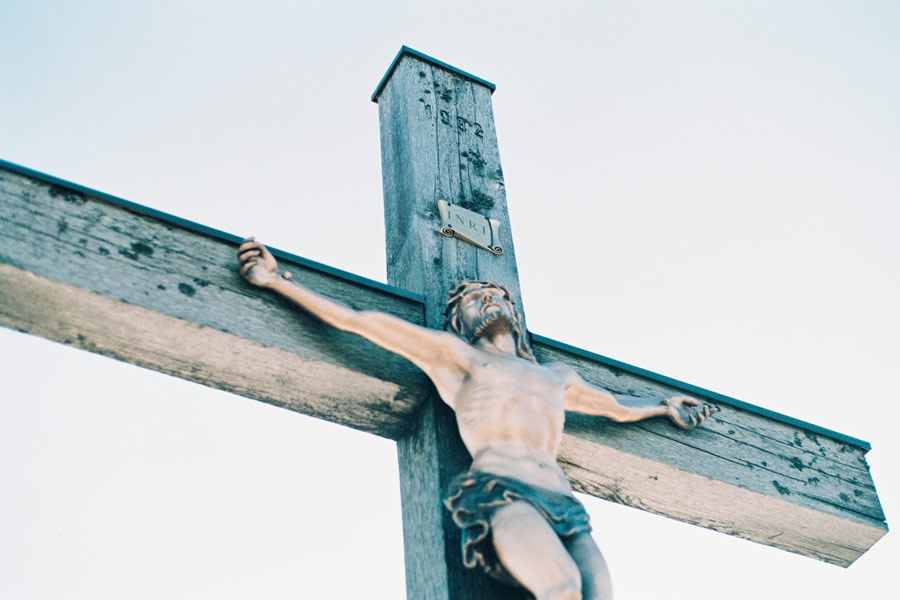
Between the King and the Criminal
by Rev. Williams Abba | 11/20/2022 | Images of FaithIn 1950, King Farouk of Egypt told a group of reporters that soon enough, there would be only five kings left in the world: the king of hearts, the king of spades, the king of diamonds, the king of clubs and the king of England.
The fate of kings is behind our first reading today. King David has come a long way from tending sheep and playing on his harp. He was a shepherd from Bethlehem before he was called to the court of Saul: his job was to play the kind of music that would entice the king out of his fits of depression. He proved more than a musician; he killed the giant Goliath and distinguished himself in battle. King Saul, however, became nervous about David's success and popularity and threw a javelin in his direction twice. He was a rotten shot. The harpist was forced to flee and started his own guerrilla movement in the Judean hills, where he remained until the death of Saul.
When Saul died, David was promoted from being a criminal to being the king of Judah, the strongest of the tribes in the South. David had his eyes on the northern tribes and their territory, and after seven years, he was accepted as the king of Israel. As we heard from the first reading of today’s beautiful liturgy, when David travels north to make the arrangement with the tribes, their leaders remind him: “We are your own flesh and blood.” With the kinship established, kingship is conferred. So, David is anointed King of Israel.
When Luke comes to tell the story of Jesus, he is careful to present Jesus in kinship with a particular people and their history. Jesus is born into a tradition. So, Gabriel announces to Mary: “The Lord God will give him the throne of his ancestor David; he will rule over the House of Jacob forever and his kingdom will have no end.” When Jesus is born, the birth takes place in “the town of David called Bethlehem.” Jesus is of royal lineage, but He will refuse to occupy a throne. At the beginning of His public life, Jesus is tempted in the desert. One of the temptations is to exercise power and authority over the kingdoms of the world. Rather than establish a kingdom that is not of this world, Satan tempts Jesus to govern existing kingdoms. But that is not His way. He resists the authority of domination, the power that exalts itself and exults in itself. His route is along the path of powerlessness. And He tells His followers: “Among the pagans, it is the kings who lord it over them, and those who have authority over them are given the title Benefactor. With you, this must not happen.” (Lk 22:25).
Jesus also educates His followers to have a healthy suspicion of the religious authority of His day. Those who spent their time inventing new burdens for people and investing in handcuffs were not to be imitated. He warns against the kind of authority that refuses to busy itself in lightening the heavy burdens that people carry. The kind of authority that will not lift a finger to help others is alien to the values of Jesus.
The authority of Jesus is the authority of His unique holiness. No one on earth conferred that authority on Him and no one could take it away. People kept asking, “Where did He get all this?” Or they demanded to know, “By what authority do you do these things?” Jesus’ authority came from His Father, who endowed Him with the spirit and with power. He needed no other investiture. His kingdom is one that looks out for people who are ignored in every other kingdom: the poor and the broken and the wounded. This is especially true in Luke's Gospel that we have heard throughout this liturgical year. It is fitting then that Jesus should end up crucified between two criminals, between the kind of people He sought out in His ministry to tell them the good news that they had a kingdom for their repentance.
Throughout His ministry, Jesus shared His forgiveness; He died breathing it. He died as He lived, reaching out to the distressed on either side of Him. In the midst of His own agony, He still has time for others. The crown He wears is of thorns. The throne He has is the cross. His royal banner is a scribbled sign that He is the king of the Jews. That is the gospel image of royalty: the king and the criminal who go together into paradise. This is the king we celebrate and whose values we are pledged to live. Our journey to our liberation is in sight. Advent has come upon us. The king of the world and the king of our hearts will soon be born. He shall come to liberate us. His reign will usher in peace and justice. May His kingdom come with the speed of light.
BACK TO LIST BACK